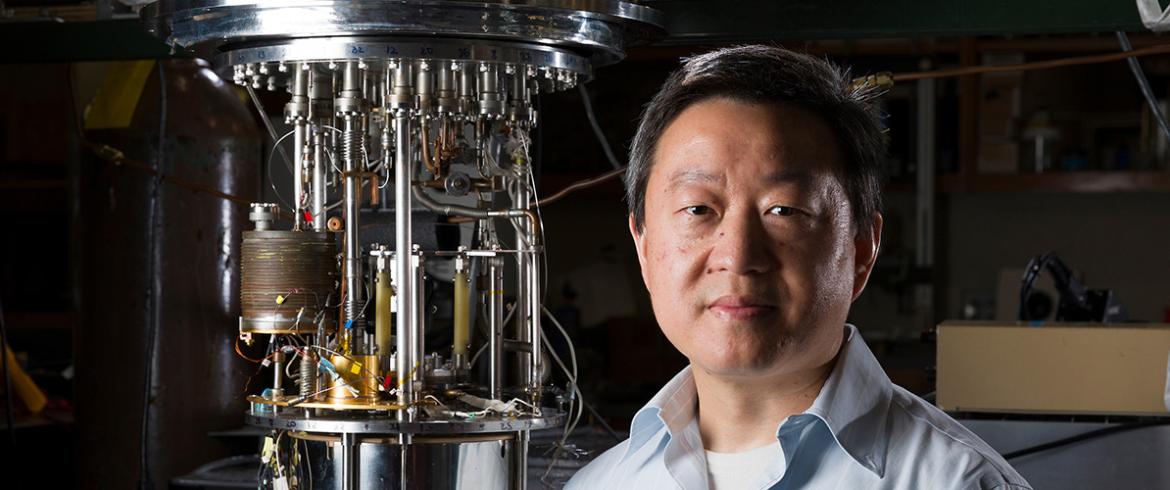
Wei Guo, Ph.D., professor and graduate director for the Department of Mechanical Engineering at FAMU-FSU College of Engineering, poses with a disassembled magneto-optical cryostat, revealing the superconducting magnet and internal components used to magnetically levitate a liquid helium droplet up to 1 cm in diameter within the magnet’s central bore, in his cryogenics lab at the National High Magnetic Field Laboratory in Tallahassee, Florida. (Scott Holstein/FAMU-FSU College of Engineering)
Wei Guo, a mechanical engineering professor from the FAMU-FSU College of Engineering has been selected to serve on the board of directors of the esteemed Cryogenic Society of America (CSA). His five-year term set to commence in January 2025 and it’s a role that promises to bring a wealth of knowledge and innovation to the field of cryogenics.
“I’m thrilled to join the CSA and advocate for cryogenics engineering education, especially in helium cryogenics,” Guo said. “I believe it’s essential to broaden its reach and impact future innovators.”
As the graduate committee chair for mechanical engineering and a researcher at the National High Magnetic Field Laboratory, Guo has big plans for educating the next generation of engineers.
He is enthusiastic about graduate and undergraduate students having more opportunities to take engaging courses in cryogenics that will lead to impactful careers in national accelerator labs, NASA, and various private-sector cryogenics divisions.
“The CSA Board comprises distinguished scientists and engineers in cryogenics, overseeing the society’s operations,” stated John G. Weisend II, professor and CSA Chairman. “Professor Guo’s exemplary record in liquid helium cryogenics research and development will undoubtedly bring vital insights to help advance and expand the CSA.”
In 2023, Guo was named a Fellow of the American Physical Society, a testament to his significant contributions to the field. He currently spearheads multiple groundbreaking research projects, including a deep dive into quantum and classical turbulence using liquid helium-4, supported by the Gordon and Betty Moore Foundation, which also honored him with the Experimental Physics Investigator Award.
His other projects include researching liquid helium’s fluid dynamics for accelerator applications and examining interactions of light-dark matter with zero-field detectors funded by the U.S. Department of Energy. Additionally, he is engaged in a NASA-funded study titled “Integrated Zero-Emission Aviation Using a Robust Hybrid Architecture,” and conducting a stereoscopic visualization study of turbulence in He II, backed by the National Science Foundation.
“Professor Wei Guo’s contributions to low-temperature physics, particularly in superfluid helium imaging, superconducting accelerator magnet protection analysis, and quantum fluid dynamics, have been of the highest caliber,” remarked John Pfotenhauer, professor at the University of Wisconsin-Madison and a former president of the CSA. “His presence on the CSA’s board will infuse essential perspectives on fundamental cryogenic research.”
The Cryogenic Society of America is a non-profit organization dedicated to advancing research in helium cryogenics, perfectly aligning with Professor Guo’s area of expertise.
RELATED ARTICLES
Electrical Engineering Professor Elected to Cryogenic Society Board of Directors
Researchers Confirm Theory for Superfluid Helium
FAMU-FSU cryogenic researchers use the science of “cool” to advance particle accelerator development
